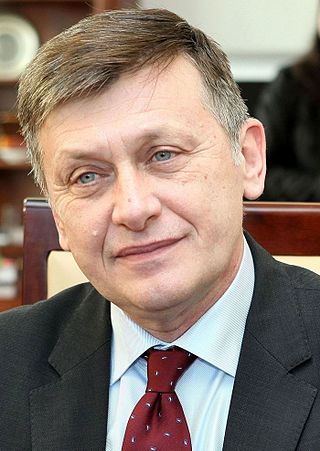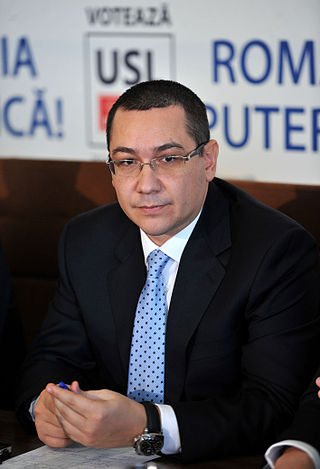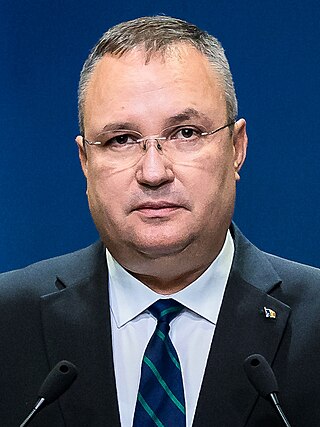
The Social Democratic Party is the largest political party in Romania, though in the European Parliament, it is the second largest by total number of political representatives, after the National Liberal Party (PNL). It is also the largest social democratic political party in the country. It was founded by Ion Iliescu, Romania's first democratically elected president at the 1990 Romanian general election. It is currently part of the National Coalition for Romania (CNR), which is a big tent grand coalition comprising also the National Liberal Party (PNL). The CNR formerly included the Democratic Alliance of Hungarians in Romania (UDMR/RMDSZ) until mid June 2023.

Călin Constantin Anton Popescu-Tăriceanu is a Romanian politician who was Prime Minister of Romania from 29 December 2004 to 22 December 2008. He was also president of the National Liberal Party (PNL) and the vice-president of the European Liberal Democrat and Reform Party (ELDR), two positions he assumed in 2004.

Eduard Raul Hellvig is a Romanian political scientist, journalist and politician who served as director of the Romanian Intelligence Service (SRI) from 2015 to 2023. A former member of the National Liberal Party (PNL) and previously of the Conservative Party (PC), he represented Bihor County in the Romanian Chamber of Deputies from 2004 to 2008, and sat for Ilfov County from 2012 to 2013. In the Victor Ponta cabinet, he was Minister of Regional Development and Tourism in 2012. In 2007, he was a Member of the European Parliament (MEP) for Romania, a position he once again took up in 2013, and which he left upon becoming SRI director.

George Crin Laurențiu Antonescu is a Romanian politician, who was President of the National Liberal Party (PNL) from 2009 to 2014. He also served as the country's Acting President after the impeachment of Traian Băsescu and as the President of the Senate.

Ludovic Orban is a Romanian engineer and politician who was the prime minister of Romania from November 2019 to December 2020. He was president of the National Liberal Party (PNL) between 2017 and 2021, which expelled him shortly after he lost a bid for another term as its leader. He was also minister of transport from April 2007 to December 2008 in the second Tăriceanu cabinet.

Radu Stroe is a Romanian navigational engineer and politician. An independent, he was formerly a member of the National Liberal Party (PNL). He was a member of the Romanian Chamber of Deputies for Maramureș County from 2000 to 2004, and sat in the Romanian Senate from 2004 to 2008, representing the same county. He returned to the Chamber in 2010, representing Bucharest, and started a new term in 2012, sitting for Ilfov County. In the Călin Popescu-Tăriceanu cabinet, he was Minister Delegate for the General Secretariat of the Government from 2006 to 2007. In Victor Ponta's first cabinet, he was Minister Delegate for Administration between August and December 2012, when he was promoted to Interior Minister. He resigned that post in January 2014.

Gabriel Oprea is a Romanian politician and a general in the army reserves. The former president of the National Union for the Progress of Romania (UNPR) and a former member of the Social Democratic Party (PSD) who is now an independent, he was a member of the Romanian Chamber of Deputies for Ilfov County from 2004 to 2012 and was a Senator for Bucharest from 2012 to 2016.

Victor Viorel Ponta is a Romanian jurist and politician, who served as Prime Minister of Romania between his appointment by President Traian Băsescu in May 2012 and his resignation in November 2015. A former member of the Social Democratic Party (PSD) and its leader from 2010 to 2015, he was also joint leader (2012–2014) of the then-governing Social Liberal Union (USL), an alliance with the National Liberal Party (PNL). Ponta was a member of the Romanian Chamber of Deputies for Gorj County from 2004 to 2020. In the Emil Boc cabinet, he was Minister-Delegate for Relations with Parliament from 2008 to 2009.

Dan Nica is a Romanian engineer and politician. A member of the Social Democratic Party (PSD), he has been a Member of the European Parliament since 2014. He held a seat in the Romanian Chamber of Deputies for Galați County from 1996 to 2014. In the Adrian Năstase cabinet, he was Minister of Communications and Information Technology from 2000 to July 2004. In the Emil Boc cabinet, he was the Vice Prime Minister and Minister of Administration and Interior between February and October 2009. In the Victor Ponta cabinet, he served as Communications Minister for a second time, from May 2012 to February 2014.
Relu Fenechiu is a Romanian businessman and former politician. A former member of the National Liberal Party (PNL), he was a member of the Romanian Chamber of Deputies for Iași County from 2004 to 2014. In the Victor Ponta cabinet, he served as Transport Minister from 2012 to 2013. Convicted of corruption in 2013, he went to prison the following year and was released in 2017.

Parliamentary elections were held in Romania on 9 December 2012. The Social Liberal Union (USL) co-led by former Prime Minister Victor Ponta won an absolute majority in both the Chamber of Deputies and the Senate. At the time of the elections, despite the severe weather in several parts of the country, the turnout was approximately 42%, slightly higher than the last parliamentary elections held in 2008 which saw a turnout of 39%.
The 2012 Romanian constitutional crisis was a major political and constitutional conflict between President Traian Băsescu and Prime Minister Victor Ponta of Romania. A dispute arose between the two regarding the representation of Romania to the European Council reunion of June 28, 2012. The dispute degenerated in civil disobedience and conflicting views between political parties. On 12 December 2012, Băsescu and Ponta signed an agreement on institutional cohabitation, effectively ending the crisis.

The Roșia Montană Protests were a series of protests in 2013 in Bucharest, Cluj-Napoca, Iași and dozens of other cities in Romania and abroad against the Roșia Montană mining project. Protesters said that the mining project would destroy the environment and heritage of Roșia Montană and demanded the withdrawal of a law which would enable this project to commence. In Bucharest, protests were held every evening in the University Square and marches were held each Sunday.
This is a list of 2014 events that occurred in Romania.

The 2012–2015 unrest in Romania refers to a prolonged period of civil unrest and political scandals in Romania, which took magnitude after the second half of the 2000s. The wave of civil demonstrations started in January 2012, once with the introduction of a new health reform legislation. The protests were fueled by the austerity measures applied in May 2010, but also by the unpopularity of Băsescu-backed Boc government. The demonstrations were characterized by widespread rioting and acts of vandalism. The political situation precipitated, so Prime Minister Emil Boc decided to step down on 6 February 2012.
The Fourth Ponta Cabinet was the government of Romania from 17 December 2014 to 17 November 2015. The Cabinet was supported by the Social Democratic Party (PSD), the National Union for the Progress of Romania (UNPR) and the Alliance of Liberals and Democrats (ALDE), the alliance forged by Călin Popescu-Tăriceanu's Liberal Reformist Party (PLR) and Daniel Constantin's Conservative Party (PC). Fourteen of the ministerial portfolios were held by PSD members, three by ALDE, two by UNPR and two by independent members.

Sorin Mihai Cîmpeanu is a Romanian politician who served as Minister of Education in Ciucă Cabinet. He had previously held the same position in Ponta IV and Cîțu cabinets, and, between 5 and 17 November 2015, acted as Prime Minister of Romania, after President Klaus Iohannis accepted Prime Minister Ponta's resignation. Klaus Iohannis's appointment of Sorin Cîmpeanu was just a stopgap measure until a new candidate for the post was selected.

Parliamentary elections were held in Romania on 6 December 2020 to elect the 136 members of the Senate and the 330 constituent members of the Chamber of Deputies.

Nicolae Ionel Ciucă is a Romanian politician and retired general of the Romanian Land Forces who is serving as the president of the Senate of Romania. Ideologically a conservative, he served as Prime Minister of Romania between 25 November 2021 and 12 June 2023 after receiving widespread parliamentary support on behalf of his own party, the National Liberal Party (PNL) along with the Social Democratic Party (PSD) and the Democratic Alliance of Hungarians in Romania (UDMR/RMDSZ). Since 10 April 2022, he has also been serving as the president of the National Liberal Party (PNL). On 12 June 2023, he resigned as Prime Minister, being temporarily replaced by Cătălin Predoiu.














